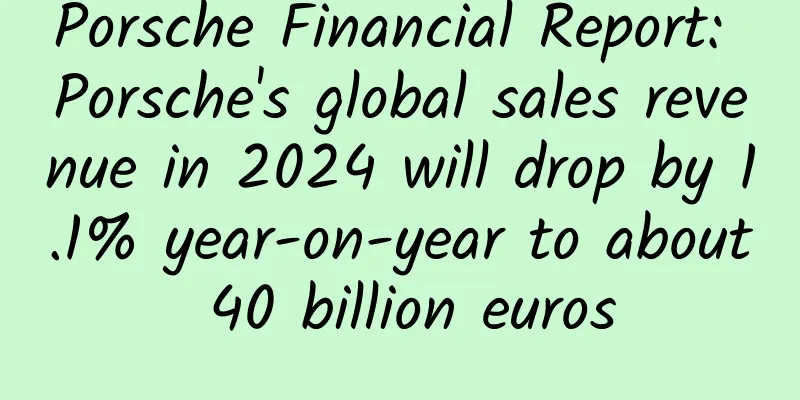Porsche Financial Report: Porsche's global sales revenue in 2024 will drop by 1.1% year-on-year to about 40 billion euros

|
Porsche, which suffered a setback in the Chinese market, has a rather unsatisfactory financial report. Last year, net profit plummeted by 30% and is shrinking at a visible rate. Revenue and return on sales are also shrinking. Of course, sales in some regions are still increasing. For example, the United States, Germany and emerging overseas markets all maintain positive growth. While global performance is booming, the Chinese market is the only one that has suffered a setback, with sales plummeting by 28%. Porsche CEO Oliver Blume said that this was mainly because China's electrification speed was too fast. Even if Porsche launched a number of electric models, it only resulted in rising costs and declining sales. “After years of record-breaking performance, we have to accept a setback in financial performance.” It is true that domestic electric vehicles have become a substitute for Porsche in the minds of many people. This time, Porsche has also recognized the reality and will no longer insist on electrification, but will instead leverage the advantages of fuel vehicles to seek stable survival. Net profit fell by 30% year-on-year According to Porsche's latest financial report data, Porsche's sales revenue in 2024 was approximately 40 billion euros, a year-on-year decrease of 1.1%; the company's net profit in 2024 was 3.6 billion euros, a decrease of 30.3% from the previous year. Operating profit was 5.637 billion euros, compared with 7.284 billion euros in the same period last year. Operating return on sales was 14.1%, compared with 18% in the same period last year. Net cash flow from the automotive business reached 3.74 billion euros, close to the historical high in 2023. Earnings per share for common stock were 3.94 euros and for preferred stock were 3.95 euros. The three best-selling models are the Cayenne with sales exceeding 100,000 units, the Macan with sales of 83,000 units, and the 911 with sales of 51,000 units. Let's take a look at the specific sales situation. The North American market has become the new "sales champion" with sales of 86,500 vehicles, surpassing China to become Porsche's largest sales market. The German domestic market has increased by 11% to 35,800 vehicles. Porsche delivered 75,900 vehicles in Europe (excluding Germany), an increase of 8% year-on-year. Only the Chinese market held back Porsche, becoming the only one of the five major sales regions to experience a decline. Jochen Breckner, member of the Porsche Global Executive Board and head of finance and information technology, also said that sales in 2024 showed a slight decline, mainly because the market environment in China is facing continuous adjustments. In 2024, Porsche's sales in China were 57,000, a year-on-year decrease of 28%. Its market share also dropped from 30% at its peak to 18.3%, dropping from the world's largest market to the world's third, the worst performance in the past five years. Porsche CEO Oliver Blume said, "2024 will be an extremely challenging year for the entire European automotive industry. We expected this, but the situation has continued to deteriorate throughout the year. We are also experiencing a sharp decline in demand in the Chinese luxury car market. In addition, costs are increasing in many areas, especially in the supply chain." Porsche quickly launched four new models in 2024, the most new model launches in a single year ever, but the renewal of as many as five-sixths of the model range also hurt the company's profitability. The rapid rise of domestic electric vehicles also caught Porsche off guard. Now we can buy a Porsche alternative at half the price or even one-third of the price. In addition to the Chinese market, Blume believes that the challenges facing Porsche also include a slowdown in electrification and tight supply chains. Regarding this year's goals, Porsche said that 2025 is defined by Porsche as the "year of recalibration". The company will make adjustments in terms of cost structure optimization and profitability improvement, and the goals set are much lower than before. For example, in terms of cost structure, Porsche will recalibrate to an annual production level of 250,000 vehicles (not a sales target). Porsche hopes to control production costs at an annual production expenditure level of 250,000 vehicles. At the same time, Porsche said that due to the "unstable political and economic environment", the company's current medium-term profit margin target has been reduced to 15%-17%, lower than the previous 19%. Based on this, Porsche expects its profitability to decline further in 2025, with operating return on sales falling to 10%-12%, lower than 14.1% in 2024; sales revenue is expected to be 39 billion to 40 billion euros in 2025, also lower than in 2024. In terms of research and development, Porsche's global executive board chairman Oliver Blume said that Porsche will invest an additional 800 million euros in new technologies such as product research and development, software services and battery technology. The Chinese market no longer pursues sales Against the backdrop of sales pressure and declining profits, Porsche sees 2025 as the "year of recalibration." Among the models delivered by Porsche in 2024, 27% are new energy vehicles, which is a good proportion among all foreign luxury brands. But it also means that Porsche's basic market is still fuel-powered models. "We will turn our attention back to internal combustion engines and hybrids," said Blume, adding that Porsche will further strengthen the core of the Porsche brand by adding internal combustion engine models. Before this, Porsche was considered one of the most radical traditional car companies in the field of electrification. According to the original plan, by 2030, electric car sales will account for more than 80% of new car sales. At this earnings conference, Porsche also clearly mentioned that it will extend the product transition period and will no longer rush to switch to electrification. In other words, subsequent products will continue to provide a balanced product portfolio of pure electric, internal combustion engines and hybrid power. For example, Porsche's core model 911 will expand more internal combustion engine models. Porsche will also release a limited edition 911 model to replicate the classic style of the 911 in the 1970s. In addition, Porsche will also launch a new 911 derivative model. Some existing models will continue to be offered with three different drive systems. In the 1930s, the Cayenne and Panamera will continue to be developed and sold with internal combustion engines and hybrid systems. In the SUV segment, Porsche is also considering launching a new model series by 2030, which will also offer internal combustion engine and hybrid versions. Of course, the electrification process is still advancing, and Porsche's future research and development focus will be on fast driving and fast charging. For example, the 718 series will soon launch a pure electric model, while the Macan will only offer a pure electric version in the future, and the upcoming fourth-generation Cayenne will also add a pure electric model. Based on this, Porsche has decided to postpone the goal of achieving more than 80% of its delivered vehicles as pure electric vehicles by 2030, and no longer set a time limit. Blume said that in view of market development, he believes that this goal is no longer realistic, and Porsche's promotion of electrification will be flexibly adjusted according to market development. In addition, Porsche has also launched a large-scale organizational restructuring plan - layoffs and changes in profit margins. It plans to cut about 3,900 jobs, which will be completed by 2029, of which about 1,900 jobs will be cut through natural mobility, restricted recruitment and voluntary agreements, and another 2,000 fixed-term contract positions will not be renewed. The 1,900 layoffs are mainly concentrated in the Zuffenhausen and Weissach plants in Germany. Through voluntary measures such as early retirement and compensatory layoffs, while taking "restrictive measures" on the recruitment of new employees, the goal is to reduce the number of employees in these two plants by 15% by 2029. Executives are no exception. In early February, due to declining sales, Porsche terminated the contracts of Chief Financial Officer (CFO) Lutz Meschke and Sales Director Detlev von Platen ahead of schedule. Both executives have worked at Porsche for more than 20 years. Bai Yuhan said that Porsche will make adjustments in profitability and set a medium-term target of 15%-17% in return on sales, while the long-term goal will still stick to the previous figure of "more than 20%." Porsche has also repeatedly stressed that it insists on "quality over quantity". Compared with how many cars it sells, this luxury car company is more willing to focus on how much money it can make from each car sold, and attaches importance to profits rather than selling cars at a loss. Especially in the Chinese market, it is no longer pursuing sales volume. "Unlike the current way Chinese automakers increase prices, Porsche emphasizes that profit is the key to the business model. High profitability is the core and cornerstone of our business model." The implication is that it would rather have a drop in sales than join a price war. It is worth mentioning that Porsche has not set a sales target in China for 2025, and Blume even hinted that it will be lower than 2024. Blume said, "Although the future volume of the Chinese market may not be exactly the same as before, Porsche's value will still remain high." Not pursuing sales volume does not mean that the Chinese market is no longer valued. In order to break the impasse, Porsche has also taken many actions. At the end of last year, Porsche was exposed to start layoffs in China, with the layoff rates of formal employees and outsourced employees being 10% and 30% respectively, and the compensation plan being "N+6". Although Porsche China denied the news of layoffs in China, it admitted that the internal organizational structure was being optimized and reorganized. Moreover, in view of the decline in customer demand and sales in the Chinese market, it is imperative to integrate the dealer network. It is planned that by the end of 2026, Porsche's stores in China will be reduced from the current 150 to 100. At the end of last year, Porsche China also added a technical department, and former Mercedes-Benz executive Li Nan was appointed as the vice president of Porsche China's technical department. In addition to R&D work, the newly established technical department also has local procurement and quality assurance functions. In addition, Blume said, "Chinese users are more concerned about smart cabins and smart driving, and Porsche will continue to invest in this direction." And what's interesting is that in the question-and-answer session after the earnings conference, he also revealed that Porsche is looking for partners in software development and will actively utilize the Volkswagen Group's technical resources to benefit from the development of autonomous driving. Does this mean that Porsche does not rule out cooperation with Chinese technology companies in the future? |
>>: New battery technology emerges: iPhone battery life is expected to increase by 3 times
Recommend
Planting rice in a desert greenhouse! How do Chinese scientists accomplish the "impossible mission"?
What can be grown in the desert? Cacti, saxaul, w...
What licenses do e-commerce websites need?
The past 10 years have been the golden age of e-c...
In 7 days, we tested 5 fission models!
The article tests the funnel models of 5 fission ...
WiseApp: In 2024, Korean users will use generative AI applications 900 million times per month, with ChatGPT leading the way
According to the latest data, South Korea's g...
618 marketing earned 5 million in one hour, what do new brands rely on?
This year's 618 has finally kicked off. One h...
Build a user growth system from scratch?
The user growth system is an operational means fo...
How to create content in the tourism industry? Check out these eight super exciting examples!
Leo Tolstoy once said, “All great literature can ...
Fatigue, drowsiness, constant yawning, lack of energy... could it be cancer?!
Friends If you often feel Fatigue, drowsiness, co...
WeChat now has a small program called "MiXin" for information encryption
Tencent has now launched an information encryptio...
Eight crooked tricks for APP promotion! Have you ever used these tricks?
Nowadays, the popularity of APP is almost as high...
On the overall perspective of operations: strong initiative and self-reflection
The so-called overall view of operations is nothi...
Counterpoint: European passenger electric vehicle sales increased 17% year-on-year in Q3 2022
According to the latest research from Counterpoin...
BMW has lost another design expert, leaving several senior design positions vacant
Recently, according to European Automotive News, ...
3 mind maps to help you learn how to plan and operate community programs!
This is a simple mind map of paid community plann...
The "magic weight loss drug" can actually support an entire country. Do you know what the success rate of weight loss is?
The magic weight loss drug supports a country: in...









